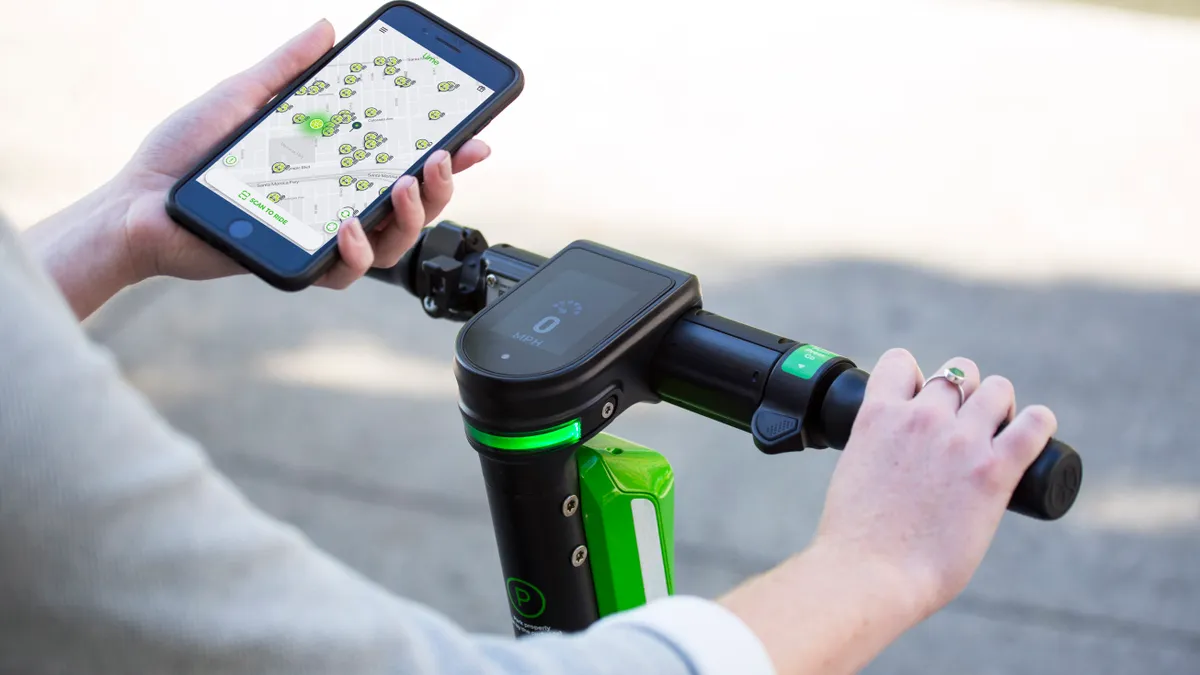Dive Brief:
- The city of Chicago announced Thursday it has awarded two-year permits to Lime, Spin and Superpedestrian to collectively operate 3,000 shared-use electric scooters across the city starting in May.
- The city previously conducted two scooter pilots, in 2019 and 2020, before passing an ordinance last October to allow up to three scooter operators. The six bids the city reviewed earlier this year included Bird, Helbiz and Chicago-based Veo in addition to the three winners.
- The announcement also said that Divvy — the Department of Transportation's city bike-share program, which Lyft operates — will integrate 1,000 docked scooters into its network of downtown bike docking stations. While most e-scooter systems have been dockless, the city says this program will create the "first docked bike and scooter system in the nation."
Dive Insight:
Chicago has considered expanding its micromobility offerings for years to realize potential benefits like improving congestion and cutting vehicle emissions. The nation's third-largest city first ran a shared e-scooter pilot in 2019 that featured 10 operators, then in 2020 with just Bird, Lime and Spin. The latter two operators will expand in Chicago this year, while Bird is not returning and Superpedestrian is joining.
Chicago's scooter program expansion seeks to address common criticisms of shared micromobility, including so-called sidewalk litter, dangers to riders and others sharing the roads, and uneven access to vehicles.
Lyft Vice President of Transit, Bike and Scooter Policy Caroline Samponaro noted in the announcement that the docking of scooters in the Divvy program will "help eliminate sidewalk clutter."
In addition, Chicago is requiring the program's scooters to have sidewalk-riding detection and cable-locking technology. For instance, Superpedestrian, which operates the LINK brand of scooters, has implemented sensors to detect bad rider behavior, such as when a vehicle is going the wrong way down a street. To discourage clutter and incentivize docking norms, only Divvy scooters will be allowed in central downtown areas at first. The city said that the policy could change mid-summer if scooter companies "meet performance targets."
In a bid to improve accessibility, Divvy scooters will be available under existing membership programs, including a $5-per-year option for low-income residents. Private scooter operators are required to place half of their scooters in "equity priority areas," which cover many South Side and West Side neighborhoods. The city also noted that while the scooter companies set their own prices, they must provide a low-income option and cash-based options for those without smartphones.
Shared micromobility and active transport advocates expressed excitement on Twitter about Chicago's announcement while noting ongoing infrastructure needs and safety concerns.
“The new program adds to the urgency for city officials to plan and build a citywide network of protected bike lanes so people on bikes and scooters have safe places to ride,” wrote Active Transportation Alliance Managing Director of Public Affairs Kyle Whitehead on Thursday. Chicago is among the major cities currently investing in significant expansions to bike lane networks as cycling sees increased popularity.
Mayor Lori Lightfoot also appeared to acknowledge high gas prices as further emphasizing a need for accessible micromobility options. “As transportation costs go up, it is critical that we support micromobility solutions like shared bikes and scooters, which provide affordable ways to travel in Chicago without needing a car,” Lightfoot said in the news release. She last week announced plans to distribute $150 prepaid gas cards to 50,000 residents and $50 prepaid transit cards to 100,000 riders.
Other major cities have also made recent announcements about significant expansions to their scooter programs. New York City said in late March it’s preparing to enter the second phase of its scooter pilot with Bird, Lime and Veo, with the number of scooters in the Bronx set to double this summer from 3,000 to 6,000.












